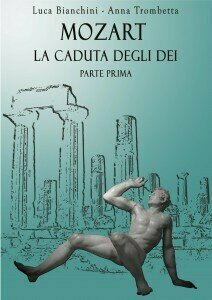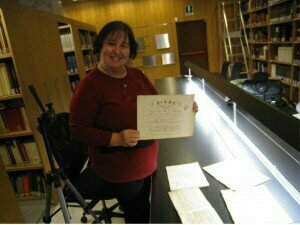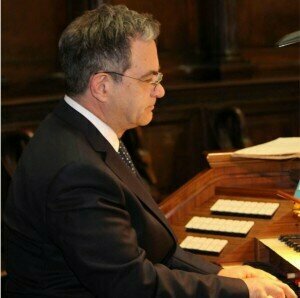 In the historiography of Western Classical music, Wolfgang Amadeus Mozart is commonly considered an exceptional and singular musical genius. This glowing assessment is partially based on countless myths and legends that have, for a variety of reasons, resisted critical and scholarly scrutiny. In a number of recent publications, musicologists Luca Bianchini and Anna Trombetta have set themselves the task of separating fact from fiction. So we asked them to share their insights:
In the historiography of Western Classical music, Wolfgang Amadeus Mozart is commonly considered an exceptional and singular musical genius. This glowing assessment is partially based on countless myths and legends that have, for a variety of reasons, resisted critical and scholarly scrutiny. In a number of recent publications, musicologists Luca Bianchini and Anna Trombetta have set themselves the task of separating fact from fiction. So we asked them to share their insights:
Q: Thank you for an illuminating and informative study. What initially prompted you to take up the “Mozart Myth” as a topic of investigation?
A: We have been studying Mozart for 20 years. In 2001 we published our first book Goethe, Mozart and Mayr: Fratelli Illuminati. Working as editors of 18th and 19th century Italian operas for 30 years, we found that a number of practically unknown masterpieces were hugely successful during Mozart’s time. Naturally, we wondered why that might have been the case, and furthermore, why composers such as Mozart had become almost mythological creatures. During our musicology studies at the University, Mozart was held up as a god, and we were convinced that he was a miracle of nature. We assumed that all the anecdotes about Mozart were credible, but when we started the fact-finding process, the myth of Mozart collapsed. Instead of a god we found a common man who had musical talent like many others of his time. To discover the real Mozart it is necessary to eliminate all what was fabricated about him over two centuries.
MOZART (actually NOT by Mozart; a forgery): Adelaïde Concert
Q: Musicology as a scientific field of study—at least as it was understood in the 19th and part of the 20th century—has recently been reshaped to include various aspects and methodologies borrowed from other disciplines. With this in mind, what questions should we be asking when it comes to Mozart in the 21st century?

Anna in Milano, Conservatorio Giuseppe Verdi, Library
Their purpose was to elevate Mozart to the status of a national hero, and to celebrate him as the creator of a German school of music. These biographies are based on anecdotes, unverified sources, or even fake news, intended, as Mozart biographer Nissen stated, to glorify Mozart. Others had commercial reasons, such as Niemetschek’s biography linked to Breitkopf & Härtel’s publication of Mozart’s Opera Omnia. The biography of Abert in the early twentieth century is entirely nationalistic, as it considers Mozart a god. Given these varying premises it is difficult to uphold a critical and scientific approach. These biographies are actually hagiographies, and musicologists act like theologians commenting on the miracles of their god.

Luca
Q: Construction of national identity on the bases of arts and culture—popular or otherwise—was not a new concept during Mozart’s time, and it is clearly still ongoing. Does the “Mozart Myth” as a political instrument still wield influence today?
A: The Habsburg dynasty governed with the lyre and the sword, that is with music and armies. The myth of Mozart was born to make German music great, and it is still influential today. Austro-Germany needed to create a national school of music, and musicology in the 1800s helped to support the process. Viennese classicism, for example, is an abstract label invented by an Austrian politician in the 1830s, and stipulates that national ideas could be spread through music. In Romanticism, art and culture were the heritage of a nation, and music was the primary means to create its identity. Mozart thus became a symbol of German music. He was a myth that turned into an icon in the Nazi era, as did Wagner. Many nationalistic distortions that originated during the Second World War reappeared in more recent books of music history, allowing the cultural Pan-German colonization. The musicians of other nations, Czechs, Bohemians, Slavs, French, Spanish, Italians, even though at the time were much more famous and appreciated than Mozart, were forgotten.
MUZIO CLEMENTI (1752-1832): Sinfonia n.3 in G major
Please join us next time for the second part of our interview with Luca Bianchini & Anna Trombetta.





“Musicology, as a scholarly discipline, has recently accepted scientific research methods. This is why it does no longer use subjective categories, and it is based on historical sources, which have to be read with a critical eye. This approach should be applied to every musician and composer… ”
Thanks to these studies (that take more than 20 years!!! ) it is possible to doubt and get out the truth from the story of all the musicians of every historical period. Our System likes that we remain ignorant and “sheep-being”… Fortunately we’ve got such editors that go on with these works and spend their time for the pleasure of the conoscence! Thank you for this article and I wish to read thousand more of this kind.
La Signora Erika è un contatto molto probabilmente finto creato ad hoc.
Sorry, but the answer in Italian that you read above my speech I did not write it. I would like to know what is happening: in this site, anyone could write anything on my behalf? I have the doubt that this can be a false debate and maneuvered and I demand explanations, thank you!
Hi Giovanni,
The comment in Italian was sent using the same email address, maybe your email address was hacked?
Hi Juliette,
I checked and it seems that my email is not hacked, so this is very strange! I also contacted the site administrators but they do not answer me. However, since I have the feeling that the only fans of Sondrio musicologists in this discussion have not even read the book in question (paradoxical!) And certainly will not read even the writings that disprove such revisionist theories, my stay in this debate and that of those who think like me no longer makes sense. Greetings to all and thank you!
Dear Erika
If you trust a book that, in order to discredit Mozart, is based largely on the lies of ufologists and distorts the authoritative opinions of those who think differently, then it is the ideal book for those who do not love Mozart and wants to denigrate and diminish at all costs. According to you it is correct, after twenty years of studies (!), Publish a full book from the first pages of historical, geographical, musical inaccuracies and typos absolutely unworthy of a scientifically serious work? The gentlemen Bianchini and Trombetta act as illusionists; enchant the reader with a flood of news (many of which are absolutely trivial and irrelevant, as well as known) aimed at disorienting those who are naive in the subject, but that are soap bubbles for those with a minimum of familiarity with history, geography , philosophy, musical composition and (above all) with common sense. It’s like a mirror for the larks and I’m sorry that a lot of people (sometimes even smart) fall into the trap! Very cordially!
This interview is three years old, but the nonsense keeps getting written. So just in case the algorithm gods have brought fresh readers here, to a site that usually trades in facts, heed this warning: There are no facts here. Bianchini and Trombetta talk as if scientific methods of manuscript analysis and historiographical criticism were just invented yesterday and that they are the first to apply them to Mozart, when both have been part of musicology for a long time. They are merely the loudest and most shameless of a recent crop of kooky conspiracy theorists and happen to be proficient in the “Gish Gallop” method of argument (Google it). Georg Predate should be ashamed of himself for being hoodwinked by this garbage pseudo-musicology.
Since 2017, there is a very learned and entertaining website dedicated to exposing the thousands of nonsense and lies contained in the writings of Mr Bianchini and his wife. Despite their vaunted diplomas, those fellows are not musicologists; rather peddlers of false information and pseudo-historical novels: “fake news”, as Professor Cliff Eisen of King’s College London put it earlier. No scholarly institution recognizes them; that’s why they have to print their brochures out of their own pockets: because no respectable publisher wants them. Pity that , an otherwise well-written and informative source, condescends to host their rants.
Mr Bianchini says: “The Habsburg dynasty governed with the lyre and the sword, that is with music and armies. The myth of Mozart was born to make German music great, and it is still influential today. Austro-Germany needed to create a national school of music, and musicology in the 1800s helped to support the process”.
Mr Bianchini se glorifie d’être en dehors des sentiers battus, faire de l’histoire comme personne et de prétendre établir des vérités historiques à partir de la seule histoire des idées, ce que ne suffit pas à remplacer la réalité vécue par les hommes, c’est à dire les faits historiques. Un historien qui ne tient pas compte des faits, c’est tout sauf un historien.
Beiläufige Beobachterin
A little linguistic help for the convenience of my candid undergraduate girls who recently wondered what Bianchini and Trombetta “are actually at to”. They say “We talk to Mozart scholars”. No, they don’t. Although they don’t provide names (they never do), it’s crystal-clear how they are campaigning to DEFUND such international research projects as “In Mozart’s Words”, maintaining that taxpayers’ moneys are squandered by the European Union on worthless endeavours, while REAL EXPERTS (themselves) would better deserve to get them.
Here’s a translation from Italian of their double talk on their Facebook page:
“We turned up our noses last week, when we read about European funds, about 200,000 euros, allocated a few years ago to put Mozart’s letters online — letters that are already super-translated, put in the public domain, cleansed in a variety of editions from Nissen’s onwards. 200,000 euros of our money to sell us on those letters which, moreover, are neither faithful nor scholarly translations (also considering the accompanying comments). They are put on the web with improved, whitewashed Italian texts, as if the Mozarts were literati from the Accademia della Crusca, and as if the readers were dummies. Actually, Mozarts’ letters are full of repetitions, with a pretty poor vocabulary, containing blunders even in German. We certainly don’t need another Nissen! 200,000 euros to fill pages and pages of unscholarly in-depth commentaries, which writers of Mozart-for-kids stuff draw on with full hands, thus providing pseudo information. And this is but an example out of many; just read Wiki to review all the lies that are told about Mozart. For years, we’ve kept opening the public’s eyes. We challenged all that crap, the fake news they tell adults and children, we sifted them through historical comparisons and we unmasked them. […] It’s high time to stop! And it’s time for Mozart experts to talk about Mozart, not journalists serving to the market.”
Worth noting: director of the multilingual “In Mozart’s Words” project, supported by an international combination of both public and private sponsors, is no less than Prof. Cliff Eisen, a renowned Mozart scholar based since 1997 in the Department of Music at King’s College London. Prof. Eisen received the Alfred Einstein Award of the American Musicological Society in 1992; his research focuses on the Classical period, particularly Mozart. On reviewing their latest self-published pamphlet “Mozart in Italia”, Prof. Eisen wrote about Bianchini and Trombetta: “I pointed out a number of problems with their work, none of which, apparently, have been addressed. I think it is worth pointing out here what some of those problems are, so that potential readers are not misled, either by the authors themselves or by positive commentaries that may be fabricated, that may or may not be impartial, or are just uninformed”.
That’s what Bianchini and Trombetta “are actually at to”: peddling their lunatic theories and fabricated expertise for money, money, money.
Please, am I the only one who is a bit suspicios because every composer they name is coincedently a Italian. Nothing wrong with Italian Composers, I love Verdi and others but it seems that these two are themeselves nationalists, which could explain their Ressentiment against Mozart. And they have clearly no idea how the german language works, neither of german history and the place Mozart has in this history. Sr for my bad english skills 🙂